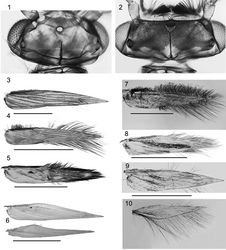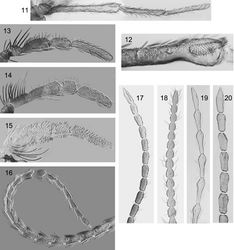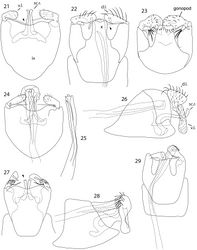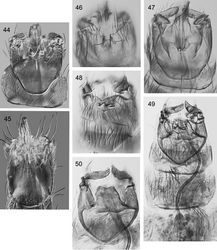Caledonotrichia bifida
| Notice: | This page is derived from the original publication listed below, whose author(s) should always be credited. Further contributors may edit and improve the content of this page and, consequently, need to be credited as well (see page history). Any assessment of factual correctness requires a careful review of the original article as well as of subsequent contributions.
If you are uncertain whether your planned contribution is correct or not, we suggest that you use the associated discussion page instead of editing the page directly. This page should be cited as follows (rationale):
Citation formats to copy and paste
BibTeX: @article{Wells2013ZooKeys287, RIS/ Endnote: TY - JOUR Wikipedia/ Citizendium: <ref name="Wells2013ZooKeys287">{{Citation See also the citation download page at the journal. |
Ordo: Trichoptera
Familia: Hydroptilidae
Genus: Caledonotrichia
Name
Caledonotrichia bifida Wells & Johanson & Mary-Sasal, 2013 sp. n. – Wikispecies link – ZooBank link – Pensoft Profile
Diagnosis
Males very closely resembling Caledonotrichia illiesi and Caledonotrichia minuta sp. n., with which they share the features of wings without scales and both lobes of gonopods rounded. Like Caledonotrichia minuta, they differ from Caledonotrichia illiesi by their smaller size and far less robust appearance, and shorter antennae; they are distinguished from Caledonotrichia minuta by having the ventral lobes of gonopods about half as long as dorsal lobes, dorsal lobes less broadly rounded, and sclerotised rods of subgenital process bifid apically, but not dilated as in Caledonotrichia minor.
Description, male
Head. Rounded in dorsal view, as in Caledonotrichia capensis sp. n. (Fig. 1). Antennae (Fig. 16) with 22–23 flagellomeres; most flagellomeres elongate-cylindrical with ends angled obliquely, not more than 2.5× width. Maxillary palps (Fig. 14) with basal segment short and rounded, segments 2, 3 and 5 cylindrical, segments 3 and 5 length about 3× maximum width, segment 4 subquadrate.
Wings. Forewing length, 1.8–2.0 mm (n=5); forewing without scales.
Genitalia (Figs 27–29, 44). Abdominal segment IX truncate proximally, distal margin of sternite shallowly excavated medially, bearing robust elongate setae. Tergite X, tapered slightly, apical margin concave. Gonopods in ventral view with ventral lobes scarcely longer than wide, dorsal lobes about with length about 2× width, twice length of ventral lobes, mesal process digitiform, well developed, without setae; axillary seta slender, acute apically. Sclerotised rods of subgenital process narrowly bifid apically (arrow in Fig. 27). Phallic apparatus elongate, slender in proximal 2/3, stouter distally, with a slender spiny paramere.
Material examined
Holotype male: New Caledonia: Province Sud, Sarraméa, 220 m, forest stream, loc 10 21°37.883'S, 165°51.958'E, Malaise trap, 18–21.xi.2001, Johanson, Pape & Viklund (MNHP).
Paratypes: New Caledonia: 1 male, collected with holotype; 3 males, Province Sud, W slope Mt. Ningua, Kwé Néco, Stream, at Camp Jacob, 3.7 km WNW summit of Mt. Ningua, on Boulouparis—Thio Road, about 50 m upstream road, 21°43.613'S, 166°06.567'E, 150 m, 29.xi–12.xii.2003, Malaise trap, loc#054, K. A. Johanson (NHRS); 2 males, Province Nord, Wan Pwé On Stream, draining NNE side of Mt. Panié, 3.9 km NW Cascade de Tao, 20°31.820'S, 164°47.016'E, 18.xii.2003, light trap, loc#085, K. A. Johanson (NHRS).
Etymology
In reference to the bilobed apices of the sclerotised rods in the male genitalia.
Original Description
- Wells, A; Johanson, K; Mary-Sasal, N; 2013: The New Caledonian genus Caledonotrichia Sykora (Trichoptera, Insecta) reviewed, with descriptions of 6 new species ZooKeys, 287: 59-89. doi
Images
|



